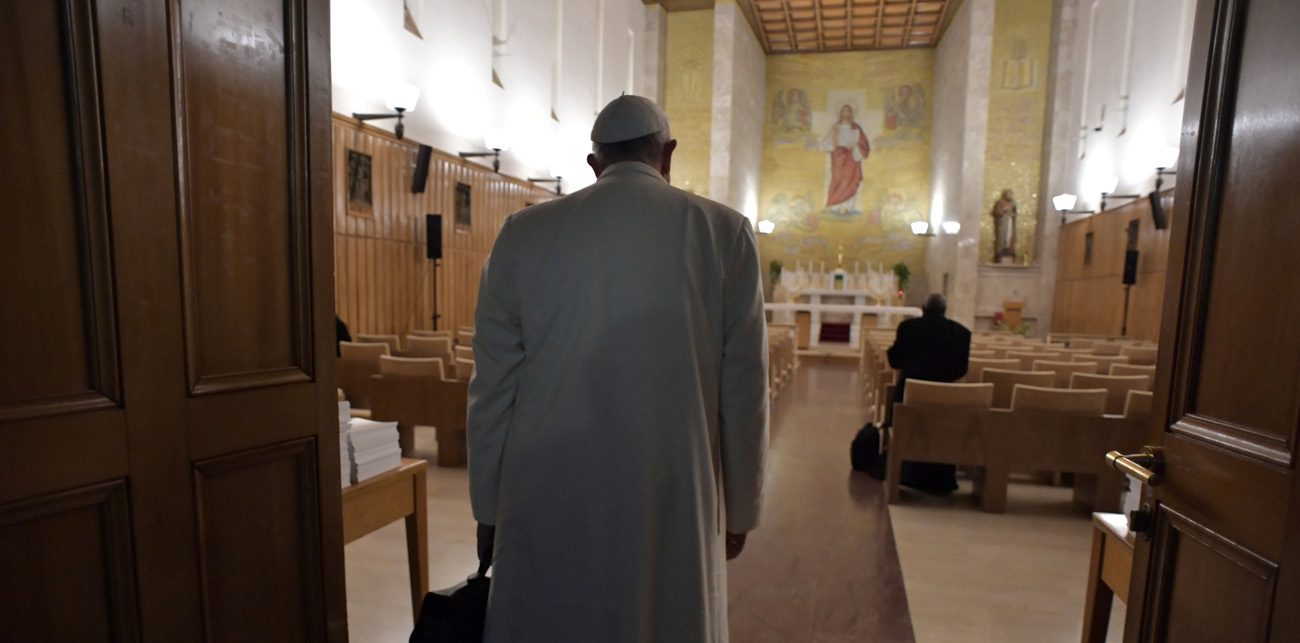VATICAN CITY (CNS) — The yearning for one’s soul to be quenched must not be confused with longing for worldly desires, a Portuguese priest told Pope Francis and senior members of the Roman Curia during their Lenten retreat.
The spiritual significance of thirst is a reminder that all Christians must distinguish between a true desire to satisfy their spiritual needs and the false satisfaction given by worldly possessions where “pleasure, passion and joy are exhausted in a wild consumerism,” Father Jose Tolentino de Mendonca, vice rector of the Catholic University of Lisbon, said Feb. 19, according to Vatican Radio.
“Let us not confuse desire with need. Desire is a lack that is never completely satisfied, it is a tension, a wound that is always open, an endless” need for something from outside oneself, he said.
[hotblock]
The 52-year-old Portuguese priest was to deliver 10 talks on the theme “In Praise of Thirst” during the retreat Feb. 18-23 at the Pauline Fathers’ retreat center in Ariccia, 20 miles southeast of Rome.
Before boarding a bus with the Curia officials for the drive out to Ariccia, Pope Francis had asked pilgrims for prayers during his Sunday Angelus address Feb. 18.
“I ask all of you to remember in your prayers myself and my collaborators of the Roman Curia who will begin the week of spiritual exercises this evening,” the pope said after praying the Angelus prayer with the faithful gathered in St. Peter’s Square.
In his main talk, the pope reflected on the Sunday Gospel reading from St. Mark, which recalled Jesus’ temptation in the desert.
Like Jesus, he said, Christians also must fight against temptation during Lent, which is a “time of spiritual challenge, of spiritual struggle.”
“We know it, evil is unfortunately at work in our existence and around us, where violence, rejection of the other, closures, wars and injustice are manifested. These things are works of the evil one, of evil,” Pope Francis said.
Although Lent is a time of prayer and penance, he added, it is not “a sad time of mourning” but rather time for “a joyful and serious commitment to strip ourselves of our selfishness, of the old person within us and renew ourselves according to the grace of our baptism.”
On the retreat’s first full day, Feb. 19, Father Tolentino’s morning meditation was titled, “The science of thirst,” and he cited Jesus’ invitation in the Book of Revelations (22:17) to “let the one who thirsts come forward and the one who wants it receive the gift of life-giving water.”
Christians, Father Tolentino said, must first acknowledge their thirst and know “just how much we thirst.”
Through the gift of pure grace, he said, Jesus quenches the souls of Christians who thirst and “comes to meet our history as it is, in its incompleteness, emptiness or failure.”
[hotblock2]
In the afternoon, Father Tolentino reflected on the theme, “I realized I was thirsty.” Christian life hinges on the acceptance of one’s own thirst, otherwise, “spiritual life loses its grip on reality,” he said.
“The opposite of thirst, which appears at times in our lives, is apathy. It is this thirst for nothing, which more or less assails us imperceptibly, that makes us ill,” Father Tolentino said.
According to the retreat schedule published by the Prefecture of the Pontifical Household, the retreat began with vespers, the first meditation by Father Tolentino and eucharistic adoration.
From Feb. 19 to 22, the pope and his top aides were to begin their day with Mass, breakfast and a meditation by Father Tolentino. After lunch at 12:30 p.m., the program gave retreat participants free time until another meditation at 4 p.m., followed by vespers, adoration and dinner.
On the final day, Feb. 23, the retreatants were to celebrate Mass together, have breakfast, listen to the last meditation, and then leave for the Vatican at 9:30 a.m.
PREVIOUS: Pope reassures foster kids, says life events can make adults ‘fragile’
NEXT: Lebanese interreligious foundation Adyan awarded Niwano Peace Prize




Share this story